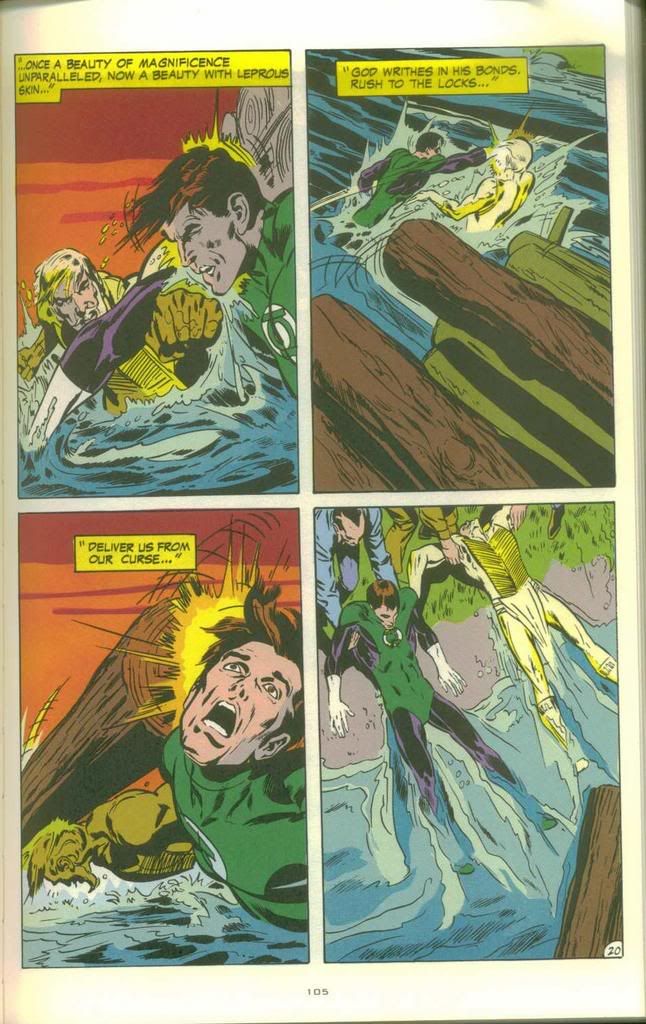When I heard this morning that Norman Mailer had died, I thought immediately of Green Lantern #79. It's the fourth issue of Denny O'Neil and Neal Adams' "relevance" run, where Green Arrow was brought in to shake up GL's establishment worldview. This particular issue found the two on opposite sides, with Green Arrow posing as a legendary Native American spiritual leader. The dramatic climax comes in the form of a fistfight, but O'Neil ups the emotional ante by setting the fight to Mailer's prose.

Along with writers like Tom Wolfe and Hunter Thomposn, Mailer was considered one of the first of the "New Journalists," who sought to bring the techniques associated with novels into mainstream journalism. His book The Armies of the Night (1968) was about his experiences surrounding the 1967 march on the Pentagon.

I'm a little embarrassed to admit I've never read Armies of the Night, or anything else by Mailer. Sorry I can't provide more context.

However, the point is not that Green Lantern #79 is improved by the addition of Mailer. (One wonders in what context the square, conservative Hal Jordan would have read anything by Mailer without first being exposed to Ollie's preaching.) Rather, the incorporation of Mailer quotes is perhaps the best example of the earnest pleas at the heart of these GL/GA stories.
In 1970 the '60s were over not just chronologically but spiritually too. Still, these stories are bubbling over with the energy, idealism, and (yes) naivete of a youthful true believer. Just as the New Journalists wanted to make their reporting seem like novels, so O'Neil and Adams wanted to blend superheroes and social concerns.
More significantly, though, the Mailer quotes read to me like Denny O'Neil inserting himself into the story in a more active role than simply the narrator. Sure, he's preaching, but he's also pleading with the reader, in a display that today we might call "too emo." However, it doesn't come across to me as pretentious, precious, or arch -- instead, it's more like Denny's attempt to engage his audience. It's not hard today to see the original GL/GA stories as overwrought and broad, but rarely do we see such nakedly personal appeals come through so clearly on the page.
It was also, I feel sure, Denny's attempt to get his readers (including his college-age readers) active and involved. In this respect The Armies of the Night represents something more than Mailer's meld of autobiography and reporting -- it signifies any number of movements in which a young person could be productive once he put down the comic. I enjoy a lot of modern superhero comics, but I'm hard-pressed to think of one which consistently tries to make its readers think about their world, and thereby make them (and it) better.
So rest in peace, Mr. Mailer, and thanks for your contribution, however small or indirect, to a run of superhero comics whose heart was definitely in the right place.
[Scans from "Ulysses Star Is Still Alive!" in Green Lantern #79, September 1970. Written by Denny O'Neil, pencilled by Neal Adams, inked by Dan Adkins, lettered by John Costanza. Color reconstruction for The Green Lantern/Green Arrow Collection by Cory Adams.]

Along with writers like Tom Wolfe and Hunter Thomposn, Mailer was considered one of the first of the "New Journalists," who sought to bring the techniques associated with novels into mainstream journalism. His book The Armies of the Night (1968) was about his experiences surrounding the 1967 march on the Pentagon.

I'm a little embarrassed to admit I've never read Armies of the Night, or anything else by Mailer. Sorry I can't provide more context.

However, the point is not that Green Lantern #79 is improved by the addition of Mailer. (One wonders in what context the square, conservative Hal Jordan would have read anything by Mailer without first being exposed to Ollie's preaching.) Rather, the incorporation of Mailer quotes is perhaps the best example of the earnest pleas at the heart of these GL/GA stories.
In 1970 the '60s were over not just chronologically but spiritually too. Still, these stories are bubbling over with the energy, idealism, and (yes) naivete of a youthful true believer. Just as the New Journalists wanted to make their reporting seem like novels, so O'Neil and Adams wanted to blend superheroes and social concerns.
More significantly, though, the Mailer quotes read to me like Denny O'Neil inserting himself into the story in a more active role than simply the narrator. Sure, he's preaching, but he's also pleading with the reader, in a display that today we might call "too emo." However, it doesn't come across to me as pretentious, precious, or arch -- instead, it's more like Denny's attempt to engage his audience. It's not hard today to see the original GL/GA stories as overwrought and broad, but rarely do we see such nakedly personal appeals come through so clearly on the page.
It was also, I feel sure, Denny's attempt to get his readers (including his college-age readers) active and involved. In this respect The Armies of the Night represents something more than Mailer's meld of autobiography and reporting -- it signifies any number of movements in which a young person could be productive once he put down the comic. I enjoy a lot of modern superhero comics, but I'm hard-pressed to think of one which consistently tries to make its readers think about their world, and thereby make them (and it) better.
So rest in peace, Mr. Mailer, and thanks for your contribution, however small or indirect, to a run of superhero comics whose heart was definitely in the right place.
[Scans from "Ulysses Star Is Still Alive!" in Green Lantern #79, September 1970. Written by Denny O'Neil, pencilled by Neal Adams, inked by Dan Adkins, lettered by John Costanza. Color reconstruction for The Green Lantern/Green Arrow Collection by Cory Adams.]


No comments:
Post a Comment